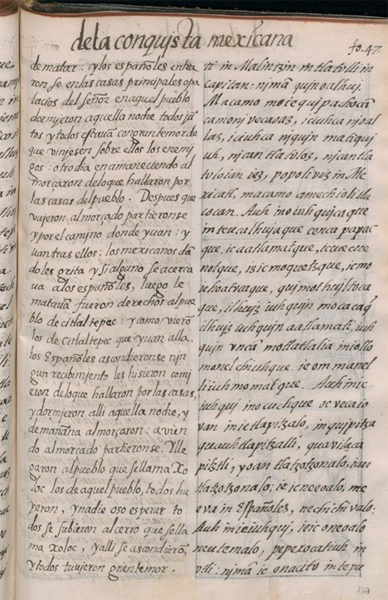Folio 47 recto
Translations and Transcriptions
Spanish Translation
[Translation of the Nahuatl into Spanish by Fr. Bernardino de Sahagún; transcription of the Spanish (left-hand column) by James Lockhart:] [f. 47r.] de matar: y los españoles entraronse en las casas principales o palacios del señor en aquel pueblo dormieron aquella noche todos jūtos y todos estauā con gran temor de que viniesen sobre ellos los enemigos: otro dia en amaneciendo almorçaron de lo que hallaron por las casas del pueblo. Despues que vuieron almorçado partieronse y por el camino donde yuan: yuan tras ellos: los mexicanos dādoles grita y si alguno se acercaua a los españoles, luego le matauā fueron derechos al pueblo de citlaltepec: y como vierō los de Citlaltepec que yuan alla, los Españoles ascondieronse ningun recibimiento les hizieron comieron de lo que hallaron por las casas, y dormieron alli aquella noche, y de mañana almorçaron: aviendo almorçado partieronse. Y llegaron al pueblo que se llama Xoloc los de aquel pueblo, todos huyeron, y nadie oso esperar todos se subieron al cerro que se llama xoloc, y alli se ascondierō, y todos tuuieron gran temor.
English Translation
[Translation of the Nahuatl (right-hand column) by James Lockhart:]
what they said to the Captain, he replied to them, “let them not be concerned, I will not be gone long, I will quickly come back and find my way to them. Here the judgment will take place, here will be the place of judgment. The Mexica will be destroyed, let them not cause you grief.”
And when the people of Teocalhueyacan heard this, they rejoiced greatly; they grew proud and presumptuous because of it, they rose up, thinking themselves preferred and fortunate. Even more than seeming satisfied and proud, they seemed to be consoled, they were convinced, they thought it true. And this to the extent that when [the Spaniards] had gone to sleep, far into the night wind instruments were being played, wooden flutes and wooden fifes, and there was drumming, war drumming.
Analytic Transcription
[Transcription of the Nahuatl (right-hand column) by James Lockhart:] [f. 47r.] ti in Malintzin in tlatolli in capitan: nimā quinoalhui. Macamo motequipachocā camo nivecaoaz, iciuhca nioallaz, iciuhca niquinmatiquiuh, nican tlatoloz, nican tlatoloian iez, popoliviz in Mexicatl, macamo amechiolitlacocan. Auh in o iuh quicaque in teucalhuiaque cenca pacque, ic aatlamatque, ic cuecuenotque, iz* ic mo quetzque, ic moiehoatocaque, quimolhuiltocaque, ilhuiziuhquin mocacaq̄** ilhuiz iuhquin aatlamati, iuhquin vncā motlatlalia iniollo monelchiuhque, ie om ma nelli momatque. Auh inic iuhqui in ocuchque oc veca iovan in ietlapitzalo, in quipitza quauhtlapitzalli, quavilacapitztli, yoan tlatzotzonalo, iautlatzotzonalo: ie ic neeoalo, meeva in Españoles, nechichivalo: Auh in ie iuhqui, ie ic oneoalo neutemalo, pepexocatiuhin vtli: nimā ic onacito in tepu ---------- *IZ. Perhaps for "ie." **MOCACAQ̄. I follow Sahagún 1950-1982: 13.76, in translating this construction, which I have not been able to analyze.
Image

Spanish Translation
[Translation of the Nahuatl into Spanish by Fr. Bernardino de Sahagún; transcription of the Spanish (left-hand column) by James Lockhart:] [f. 47r.] de matar: y los españoles entraronse en las casas principales o palacios del señor en aquel pueblo dormieron aquella noche todos jūtos y todos estauā con gran temor de que viniesen sobre ellos los enemigos: otro dia en amaneciendo almorçaron de lo que hallaron por las casas del pueblo. Despues que vuieron almorçado partieronse y por el camino donde yuan: yuan tras ellos: los mexicanos dādoles grita y si alguno se acercaua a los españoles, luego le matauā fueron derechos al pueblo de citlaltepec: y como vierō los de Citlaltepec que yuan alla, los Españoles ascondieronse ningun recibimiento les hizieron comieron de lo que hallaron por las casas, y dormieron alli aquella noche, y de mañana almorçaron: aviendo almorçado partieronse. Y llegaron al pueblo que se llama Xoloc los de aquel pueblo, todos huyeron, y nadie oso esperar todos se subieron al cerro que se llama xoloc, y alli se ascondierō, y todos tuuieron gran temor.
English Translation
[Translation of the Nahuatl (right-hand column) by James Lockhart:]
what they said to the Captain, he replied to them, “let them not be concerned, I will not be gone long, I will quickly come back and find my way to them. Here the judgment will take place, here will be the place of judgment. The Mexica will be destroyed, let them not cause you grief.”
And when the people of Teocalhueyacan heard this, they rejoiced greatly; they grew proud and presumptuous because of it, they rose up, thinking themselves preferred and fortunate. Even more than seeming satisfied and proud, they seemed to be consoled, they were convinced, they thought it true. And this to the extent that when [the Spaniards] had gone to sleep, far into the night wind instruments were being played, wooden flutes and wooden fifes, and there was drumming, war drumming.
Analytic Transcription
[Transcription of the Nahuatl (right-hand column) by James Lockhart:] [f. 47r.] ti in Malintzin in tlatolli in capitan: nimā quinoalhui. Macamo motequipachocā camo nivecaoaz, iciuhca nioallaz, iciuhca niquinmatiquiuh, nican tlatoloz, nican tlatoloian iez, popoliviz in Mexicatl, macamo amechiolitlacocan. Auh in o iuh quicaque in teucalhuiaque cenca pacque, ic aatlamatque, ic cuecuenotque, iz* ic mo quetzque, ic moiehoatocaque, quimolhuiltocaque, ilhuiziuhquin mocacaq̄** ilhuiz iuhquin aatlamati, iuhquin vncā motlatlalia iniollo monelchiuhque, ie om ma nelli momatque. Auh inic iuhqui in ocuchque oc veca iovan in ietlapitzalo, in quipitza quauhtlapitzalli, quavilacapitztli, yoan tlatzotzonalo, iautlatzotzonalo: ie ic neeoalo, meeva in Españoles, nechichivalo: Auh in ie iuhqui, ie ic oneoalo neutemalo, pepexocatiuhin vtli: nimā ic onacito in tepu ---------- *IZ. Perhaps for "ie." **MOCACAQ̄. I follow Sahagún 1950-1982: 13.76, in translating this construction, which I have not been able to analyze.
Image
